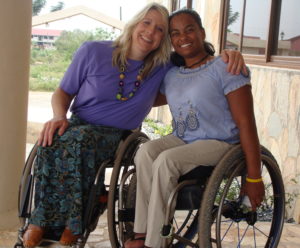Most kids dream big about what they want to be when they grow up.
Whether it’s winning Paralympic medals, teaching at a prestigious university or working to help better life for people with disabilities, Anjali Forber-Pratt, PhD, sets the example for her mantra of “Dream. Drive. Do.”
In her everyday life, she is an assistant professor at Vanderbilt University, teaching subjects catering to people with disabilities. Before any of this, Forber-Pratt was burning up the pavement as a world-famous track and field wheelchair sprinter, who not only won gold, silver and bronze medals, but also was a former world-record holder in the 200 meters.
Forber-Pratt was born in Calcutta, India, on June 22, 1984, although she didn’t grow up there. The place that she calls home is Natick, Mass. She was adopted by her parents, Lawrence and Rosalind, who met her in India after she was abandoned by her birth mother when she was 2 years old. When Forber-Pratt was 4, she was diagnosed with transverse myelitis, a spinal disease that causes inflammation of both sides of one section of the spinal-cord. This disease left her unable to move her legs.
Like any child, Forber-Pratt had big life dreams and goals.
“I wanted to be the winner of the Boston Marathon growing up,” Forber-Pratt says. “That was a very early dream that I had growing up, living on the 8-mile marker. I grew up watching people like Jean Driscoll competing in the Boston Marathon, and that experience piqued my interest in getting into sports. It was such a recurring dream that I actually dressed up on Halloween as the winner of the Boston Marathon.”
Forber-Pratt had the drive to make good on her childhood dreams.

In 2011, she put her dreams to work and placed fourth overall in the women’s wheelchair division at the Boston Marathon. That was a huge milestone in a track and field career she already had under her belt. While studying for her master’s degree at the University of Illinois, Forber-Pratt joined the track and field team.
“When I started graduate school, I felt like there was something missing from my life, and it was the really competitive side of sport,” Forber-Pratt says. “So, I had that conversation with the coach. He was a little bit wary, because when most people start graduate school people start to scale back. He told me if I was going to do this, it was going to be six days a week, and he expected me to give it my all in terms of practice and so forth. I said, ‘Yup. I know what I am signing up for. This is what I want to do.’ I was very fortunate that everything from there came together, and three to six months later I made my first national team.”
It was her drive that made her dreams come true. From 2007-2012, she appeared in national track and field championships, two Parapan American Games and two Summer Paralympic Games, all representing Team USA. She raced in the T53 100, 200, 400, 800 and the 400 relay, earning her a combined nine medals in the specification.
Her athletic career came to a screeching halt shortly after the London 2012 Summer Paralympic Games. She was scheduled for a spinal fusion procedure, one that is common for those with transverse myelitis. The surgery went terribly wrong and as a result her mobility was that of a quadriplegic for a period of time.
It took over 11 months for doctors to figure out what happened that ultimately led to four different back and spinal surgeries.
“It was discovered that I had a tethered spinal cord that I didn’t know about. It was pulling down a piece of the spinal cord and the brain stem,” Forber-Pratt says.
One of the last surgeries, called a tethered spinal cord release, restored previously lost hand function, but now she has acquired neuropathic pain and spasms.
Though her back injury will never allow her to race competitively again, Forber-Pratt still dreams of going back out on the course every day.
“I do miss it quite a bit,” she says. “I miss the camaraderie and the team dynamic and all that. I miss the competitiveness of sport and all of that. I miss that for sure.”
As much as she misses the track, the drive for education and promoting disability awareness also fuel her need for helping change the world. She does this by educating students, non-disabled and disabled alike, with after-school programs.

Also, to feed the need for competition, Forber-Pratt works directly with children with disabilities on the court, including several wheelchair basketball teams, para alpine skiers and wheelchair tennis leagues.
While she earned her doctorate from the University of Illinois, Forber-Pratt penned several op-eds and started public speaking about the rights of people with disabilities. On Aug. 13, 2013, former U.S. President Barack Obama invited Forber-Pratt to the White House to participate in a roundtable discussion allowing her to read the paper, Challenges + Competitions = Champions. Obama, in turn, recognized her as a “Champion of Change,” which is identified as someone who is:
“…embodying the next generation of leadership within the disability community and her commitment to the promise of the Americans with Disabilities Act.”
Since then, Forber-Pratt has written a children’s book about people with transverse myelitis, and she now sits on the board of Siegel Rare Neuroimmune Association.
For Forber-Pratt, “Dream. Drive. Do.” is more than just a motto or a creed. It is a life story.
You can find more out about Forber-Pratt and her “Dream. Drive. Do.” initiative at her website: anjfp.com.
2 Responses
Rock on Anjali. Love following all your work and travel ‘adventures’.
Thankful for the parents that adopted this young girl and then gave her the opportunity to “Dream, Drive, Do” another article that lends the human touch to reach all.